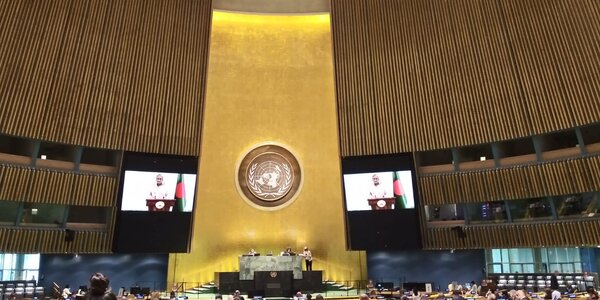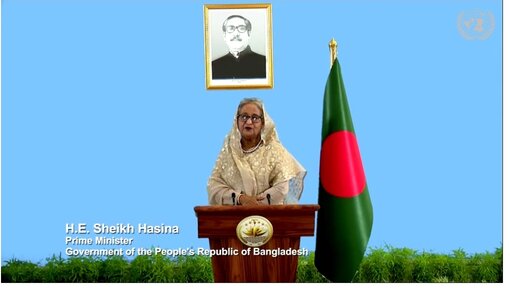Statement by Hon’ble Prime Minister H.E. Sheikh Hasina at the ‘High-Level Meeting on the 25th Anniversary of the Fourth World Conference on Women’.


Bismillahir Rahmanir Rahim
Mr. President,
Excellencies.
Assalamu Alaikum and a very good afternoon.
I am delighted to join the celebration of the 25th anniversary of the 4th World Conference on Women.
The 1995 Beijing Declaration and Platform for Action charted a bold roadmap to achieve gender equality and women’s empowerment. It has profoundly changed our outlook towards women and catalyzed positive developments.
Since then, almost all countries formulated legislative frameworks for the promotion and protection of women and girls. The 2030 Agenda also recognized women’s centrality across all the goals and targets. As we enter the Decade of Action, we must renew our commitments and enhance our efforts to ensure women’s equality, empowerment and advancement.
I thank the Secretary General for prioritizing women’s representation at senior levels of the UN. We would like to see that at all levels.
Excellencies,
Bangladesh has made tremendous development in women’s empowerment. Immediately after our independence, Father of the Nation Bangabandhu Sheikh Mujibur Rahman placed women at the heart of our development agenda. Under his legendary statesmanship, the country crafted a progressive Constitution guaranteeing equal rights for men and women.
Our development intervention, which is based on a whole-of-society approach, focuses more on the practical need of our women. That is why we have made girls’ education a priority, economic and political empowerment of women a necessity. We see women as active agents of development, not as passive recipients. We formulated a progressive Women Development Policy in 2011. The reserved seats for women in the national parliament have been risen to fifty.
At present, leader of the House, Deputy Leader of the House, Opposition leader and the Speaker of the parliament are women. Thirty percent seats are earmarked for women in local government bodies. Special provisions have been made for enhancing women’s representation in the public service.
Women are now becoming higher court judges, public university VCs, secretaries of the government ministries and so on. Gender budgeting, micro-finance and similar initiatives have ensured women’s financial inclusion.
Our investment in women is paying dividends with women thriving in every sector of our society. Today, 20 million women are engaged in agriculture, industry, and service sectors. Over 3.5 million women are working in the ready-made garments sector, our largest export-earning sector. Nearly 1,500 women military and police officials served in UN peacekeeping operations so far. Our women are breaking barriers and succeeding in careers that our previous generation could never imagine.
Our achievements in women empowerment have earned us many global accolades. According to the World Economic Forum’s Gender Gap Index, we are leading in South Asia on women’s overall empowerment, ranked 50th globally out of 149 countries, and 7th in political empowerment.
We have much more to do. The Covid-19 pandemic has particularly aggravated the vulnerability of women. During this pandemic, women are facing discrimination and increased domestic violence, and, therefore, threatening to reverse our hard-earned achievements in women empowerment.
As we work to build back better, I would like to highlight the following points:
Firstly, the world can benefit from every girl whose potential is realized, from every woman whose talent is tapped, and this can only be done through education.
Secondly, empowerment comes with income and employment. Therefore, engaging women in income-generating activities should be a priority.
Thirdly, in the context of COVID-19, the job of female workers, including migrant workers, across the global supply chains and other major employment sectors, must be protected so that they are not further marginalized and financially excluded.
Excellencies,
On this 25th anniversary, I would like to pledge to Increase women’s participation in the workforce leading to 50-50 by 2041.
I thank you all.








